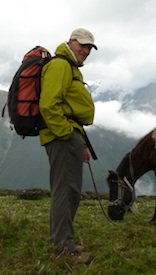 Department
DepartmentNongame Migratory Bird Management
OrganizationU.S. Fish and Wildlife Service
Emailbrad_andres@fws.gov
Location
Denver , Colorado 80225
United StatesBio
Brad has a BS in Biology from the Pennsylvania State University, and an MS and PhD in Zoology from the Ohio State University His MS work focused was on the abundance and habitat use of post-breeding shorebirds in northern Alaska, and his doctoral studies addressed the effects that the 1989 Exxon Valdez oil spill had on black oystercatchers in Prince William Sound. After completing graduate studies, he began his U.S. Fish and Wildlife Service career in Anchorage, Alaska as a migratory bird biologist. In this capacity, he helped establish and facilitate multi-agency/organization technical working groups for landbirds, shorebirds, and loons. Moving to Arlington, Virginia in 2001, Brad took on a position as National Coordinator of the U.S. Shorebird Conservation Plan. As staff to the U. S. Shorebird Conservation Plan Council, he works with partners to develop collective solutions to the conservation problems facing migratory shorebirds. Luckily, Brad is able to continue some field work in the arctic and beyond and is primarily interested in problems of bird survey design and the application of science to conservation decision-making. Brad has produced more than 50 scientific manuscripts, technical reports, and conservation plans and has given more than 30 scientific presentations. He has also used his scientific background to bring biological messages to the lay public through more than 30 popular presentations and articles.
Some representative lecture titles include:
Conserving Birds Throughout Their Annual Cycle
Evaluating the Importance of the Teshekpuk Lake Special Area Within the National Petroleum Reserve, Alaska: Predicting Shorebird Density and Abundance
When asked why he would like to participate in the AVS program Brad stated he wanted to, "Create awareness of the fabulous nature of arctic birds and the threats they face throughout their annual cycle."
Some representative lecture titles include:
Conserving Birds Throughout Their Annual Cycle
Evaluating the Importance of the Teshekpuk Lake Special Area Within the National Petroleum Reserve, Alaska: Predicting Shorebird Density and Abundance
When asked why he would like to participate in the AVS program Brad stated he wanted to, "Create awareness of the fabulous nature of arctic birds and the threats they face throughout their annual cycle."
